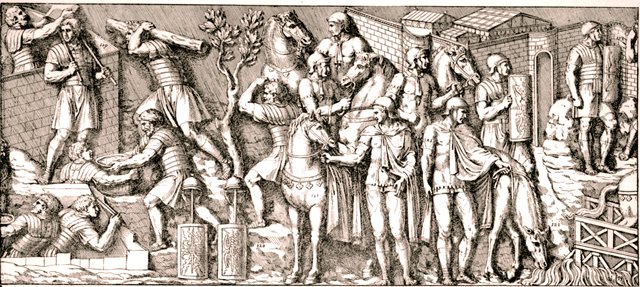
By Allison K. Halliday
Here come the Roman Legionaries,
With their fine Lorica and proud airs;
Conquered nations from shore to shore,
They brought back treasures from each war.
Here come the Roman charioteers,
With their gold Galea and gleaming spears;
Feared to be targeted by their wrath,
Countries couldn't stand in their path.
Here comes the Roman Army,
For them I feel terribly sorry;
The Great I Am governs sea and shore,
That is why Rome strives no more.
A couplet is a pair of lines of verse. It usually consists of two lines that rhyme and have the same meter. While traditionally couplets rhyme, not all do. A poem may use white space to mark out couplets if they do not rhyme. Couplets with a meter of iambic pentameter are called heroic couplets. The Poetic epigram is also in the couplet form. Couplets can also appear in more complex rhyme schemes. For example, Shakespearean sonnets end with a couplet.
Rhyming couplets are one of the simplest rhyme schemes in poetry. Chaucer's The Canterbury Tales are written in rhyming couplets. John Dryden in the 17th century and Alexander Pope in the 18th century were both well known for their writing in heroic couplets.
Because the rhyme comes so quickly in rhyming couplets, it tends to call attention to itself. Good rhyming couplets tend to "snap" as both the rhyme and the idea come to a quick close in two lines. Here are some examples of rhyming couplets where the sense as well as the sound "rhymes":
-
- True wit is nature to advantage dress'd;
- What oft was thought, but ne'er so well express'd.
- — Alexander Pope
-
- Whether or not we find what we are seeking
- is idle, biologically speaking.
- — Edna St. Vincent Millay (at the end of a sonnet)
On the other hand, because rhyming couplets have such a predictable rhyme scheme, they can feel artificial and plodding. Here is a Pope parody of the predictable rhymes of his era:
-
- Where-e'er you find "the cooling western breeze,"
- In the next line, it "whispers through the trees;"
- If crystal streams "with pleasing murmurs creep,"
- The readers threatened (not in vain) with "sleep."
(By Wikipedia)

No comments:
Post a Comment